Related Research Articles

The national flag of Ghana consists of a horizontal triband of red, yellow, and green. It was designed in replacement of the British Gold Coast's Blue Ensign.

Edward Akufo-Addo was a Ghanaian politician and lawyer. He was a member of the "Big Six" leaders of the United Gold Coast Convention (UGCC) and one of the founding fathers of Ghana who engaged in the fight for Ghana's independence. He became the Chief Justice (1966–70), and later ceremonial President (1970–72), of the Republic of Ghana. He is the father of the current (executive) President of Ghana, Nana Addo Akufo-Addo.
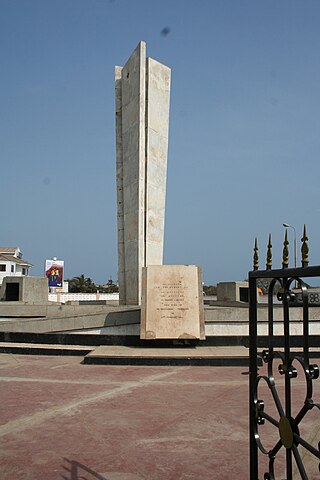
The Accra riots started on 28 February 1948 in Accra, the capital of the then British colony of the Gold Coast. A protest march by unarmed ex-servicemen who were agitating for their benefits as veterans of World War II, who had fought with the Gold Coast Regiment of the Royal West African Frontier Force, was broken up by police, leaving three leaders of the group dead. They were Sergeant Nii Adjetey, Corporal Patrick Attipoe and Private Odartey Lamptey, who have since been memorialized in Accra.
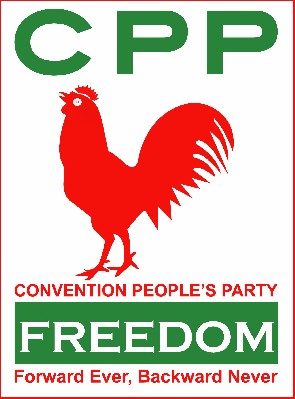
The Convention People's Party (CPP) is a socialist political party in Ghana based on the ideas of the first President of Ghana, Kwame Nkrumah. The CPP was formed in June 1949 after Nkrumah broke away from the United Gold Coast Convention (UGCC).

Joseph Kwame Kyeretwie Boakye Danquah was a Ghanaian politician, scholar, anglophile, lawyer and statesman. He was a politician in pre and post-colonial Ghana, which was formerly the Gold Coast.
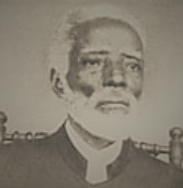
Carl Christian Reindorf was a Euro-African-born pioneer historian, teacher, farmer, trader, physician and pastor who worked with the Basel Mission on the Gold Coast. He wrote The History of the Gold Coast and Asante in the Ga language; scholars consider the book a "culturally important" work and an increasingly important source for Ghanaian history. The work was later translated into English and published in 1895 in Switzerland. He used written sources and oral tradition, interviewing more than 200 people in the course of assembling his history.
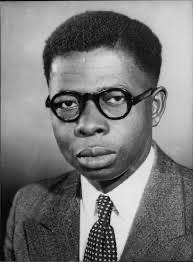
Ako Adjei, was a Ghanaian statesman, politician, lawyer and journalist. He was a member of the United Gold Coast Convention and one of six leaders who were detained during Ghana's struggle for political independence from Britain, a group famously called The Big Six. Adjei became a member of parliament as a Convention People's Party candidate in 1954 and held ministerial offices until 1962 when as Minister for Foreign Affairs he was wrongfully detained for the Kulungugu bomb attack.
The Big Six were six leaders of the United Gold Coast Convention (UGCC), one of the leading political parties in the British colony of the Gold Coast, known after independence as Ghana. They were detained by the colonial authorities in 1948 following disturbances that led to the killing of three World War II veterans. They are pictured on the front of the Ghana cedi notes.

Emmanuel Odarkwei Obetsebi-Lamptey was a political activist in the British colony of the Gold Coast. He was one of the founding fathers of the United Gold Coast Convention (UGCC) known as "The Big Six". He was the father of NPP politician Jake Obetsebi-Lamptey. He played a vital role in the Big Six. He was recognized for his leadership. He was bold, confident and inspired his people to have hope. His leadership role being played well brought a change to the political, economical and social standards required to pronounce Ghana as an independent country from its colonial masters. Many argue that together with the rest of the big six with the exception of Dr. Nkrumah didn't contribute enough to the independence of Ghana to merit the recognition given them in present day Ghana.
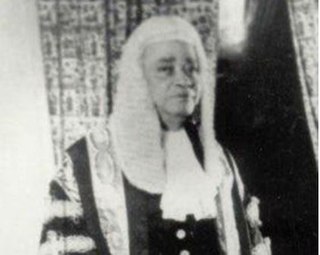
Sir Emmanuel Charles Quist, also known as Paa Quist was a barrister, educator and judge who served as the first Speaker of the Gold Coast Legislative Assembly and the first Speaker of the Parliament of Ghana.

General elections were held in Gold Coast on 8 February 1951. Although elections had been held for the Legislative Council since 1925, the Council did not have complete control over the legislation, and the voting franchise was limited to residents of urban areas meeting property requirements and the councils of chiefs.
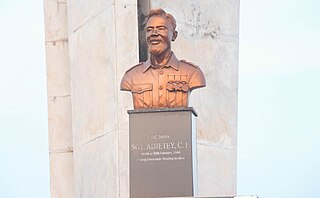
Sergeant Cornelius Francis Adjetey was a Ghanaian ex-serviceman and veteran of World War II. He was one of the three veterans – the others being Corporal Patrick Attipoe and Private Odartey Lamptey – shot dead by Major Imray while on their way to present a petition to Sir Gerald Creasy, who was Governor of Gold Coast at the time. The death of these three ex-servicemen led to the 1948 Accra riots.
Corporal Patrick Attipoe was a Ghanaian ex-serviceman and veteran of World War II. He was one of the three veterans shot dead by Major Imray while on their way to present a petition to Sir Gerald Creasy who was Governor of Gold Coast at the time. The death of these three ex-servicemen led to the 1948 Accra Riots.
Private Odartey Lamptey was a Ghanaian soldier and activist. He was one of the three veterans shot dead by Superintendant Colin Imray while on their way to present a petition to Sir Gerald Creasy who was Governor of Gold Coast at the time. The death of these three ex-servicemen led to the 1948 Accra Riots.

Gottlieb Ababio Adom was a Ghanaian educator, journalist, editor and Presbyterian minister who served as the Editor of the Christian Messenger from 1966 to 1970. The Christian Messenger, established in 1883 by the Basel Mission, is the primary newspaper of the Presbyterian Church of Ghana.
Adeline Sylvia Eugenia Ama Yeboakua Akufo-Addo was a First Lady of the second republic of Ghana as the wife of president Edward Akufo-Addo. She was the mother of president Nana Akufo-Addo.
Nii Kwabena Bonnie III, also known as Kwamla Theodore Taylor, was a Ghanaian (Ga) traditional ruler in Gold Coast, a British colony in West Africa, in 1947. He was a chief of Osu Alata Mantse and Oyokohene of Techiman.
The Association of West African Merchants (AWAM) was a trade association that sold European goods in the Gold Coast. It was originally formed in 1916 for European merchants to discuss problems relating to West African trade. The Gold Coast branch was formed during the late Second World War as suggested by the government to assist in the administration of the war-time economic controls. The acronym AWAM over the years became used to mean the manipulation of terms of trade to disadvantage customers in favour of traders. In the local parlance, it was synonymous with "Kuluulu".
The Coussey Committee was established on 14 March 1949, after the 1948 Accra riots, to draft a constitution towards self-rule for the country Gold Coast. The committee was chaired by Sir Henley Coussey and published their report on 7 November 1949.
The Watson Commission was a commission of enquiry appointed by Sir Gerald Hallen Creasy, governor of the Gold Coast (1948–1949) to investigate the disturbances that occurred in the Gold Coast in February and March 1948. The commission was chaired by Aiken Watson.
References
- ↑ Opoku-Agyemang, Lovelace. "Ghana: 58 Years After the February 28th 1948 Crossroads Incident". AllAfrica. Retrieved 5 October 2014.
- 1 2 "Rulers-Ghana". B. Schemmel. Retrieved 29 July 2011.
- 1 2 "Ghana is 50, UGCC is 60, too". News:Editorials . The Statesman. 26 March 2007. Archived from the original on 28 September 2007. Retrieved 29 July 2011.
- ↑ "KWAME NKRUMAH: THE FIGHT FOR INDEPENDENCE". GuyanaUnderSiege.com. Retrieved 29 July 2011.
- 1 2 Kosi Dedey (8 March 2007). "The "Big Six", Myth or Reality?". Feature article. Ghana Home Page. Retrieved 29 July 2011.
- ↑ Allan D. Ohene (March 2002). "Ghana before Independence". Ghana General Info-History. Lion's Den Ltd. Retrieved 29 July 2011.
- ↑ "Rulers-Malta". B. Schemmel. Retrieved 29 July 2011.